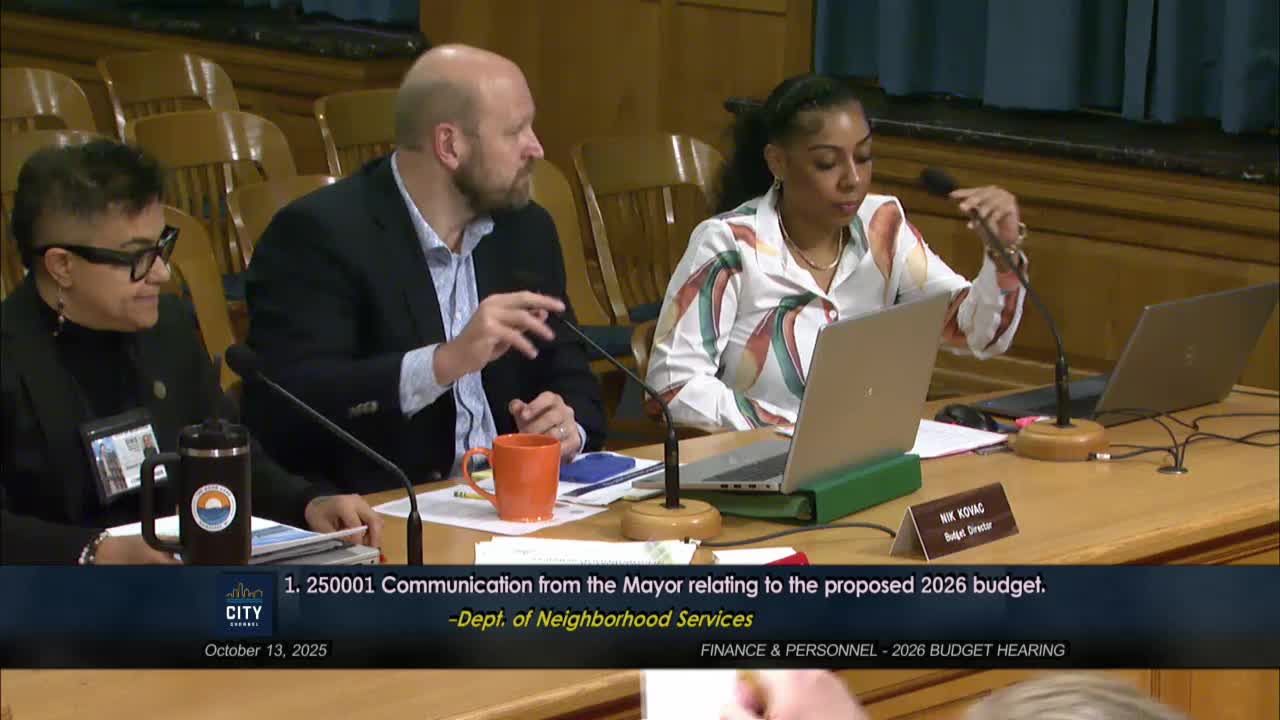Milwaukee Department of Neighborhood Services presents 2026 budget, highlights short‑term rental crackdown, illegal‑dumping cameras and staffing shifts
Get AI-powered insights, summaries, and transcripts
Subscribe
Summary
The Milwaukee Department of Neighborhood Services presented its 2026 executive budget to the Finance & Personnel Committee on Oct. 13, 2025, reporting modest overall reductions in staffing and salary costs while detailing enforcement priorities — notably advisory outreach to 1,300 unlicensed short‑term rental listings and expansion of illegal‑dumping camera enforcement — and new technology and staffing adjustments to speed permitting and inspections.
The Milwaukee Department of Neighborhood Services (DNS) presented its proposed 2026 executive budget to the Finance & Personnel Committee on Oct. 13, 2025, offering small net reductions in positions and salary costs while identifying enforcement priorities and technology upgrades.
DNS reported a total proposed operating figure of roughly $25.9 million and described operational gains in permit processing and complaint response. The department also told the committee it has identified about 1,300 short‑term rental listings that currently lack city licensing and intends to issue advisory letters with a 30‑day compliance window before formal enforcement.
DNS budget and staffing
Budget analyst Shaquita Winters told the committee the department’s 2026 proposed levy‑funded budget is $25,881,545, a roughly 1% decrease from the prior adopted budget, with salary costs reported at $14,927,619 (a 2% decrease). The 2026 proposal shows 254.5 FTEs and 290 total positions, a reduction of 1 FTE tied to a reorganization in special enforcement and other internal changes.
Commissioner Hesa Mila Arroyo Vega described internal shifts and performance gains in the department’s development center, court and enforcement divisions. The department said it reduced the average days to first plan review from around 26 days in 2023 to about 15 days in 2025, and average days to issue a permit from roughly 70 days in 2023 to about 50 days in 2025.
Short‑term rental enforcement and animal nuisance staffing
DNS said it purchased compliance software that helped identify about 1,300 short‑term rental listings without licenses; the department plans to send advisory letters and allow 30 days for voluntary compliance before pursuing enforcement. Separately, DNS said it is proposing two inspectors dedicated to animal‑nuisance cases after reporting a substantial increase in complex animal‑related complaints and bite incidents that demand extended investigation and staff support.
Illegal dumping cameras and technology investments
DNS briefed members on its illegal‑dumping camera pilot. The department reported about 19 citations issued that were identified using camera evidence and said the cameras have significantly increased enforcement leads and citation issuance. The department also reported a marked increase in dumped‑item citations and associated revenue and said it is exploring partnerships with sanitation truck deployments and AI tools, while acknowledging privacy and legal constraints on placements and data use.
DNS staff described additional technology investments: replacing field tablets and iPads for inspectors, implementing image cloud storage for inspection records, beginning a transition to digital inspection reports and checklists, and preparing for an electronic plan review rollout in January 2026.
Complaints, inspections and vacant‑property work
The department said it had received more than 24,000 complaints year to date (with an annual historical range of roughly 37,000–40,000 complaints). Average time from complaint to inspection was reported to have fallen from roughly 40 days in 2023 to about 6 days in 2025; DNS said it is targeting an average of 5 business days. DNS also described improvements in the vacant‑building program and noted it had demolished about 80 properties designated as “concentrated blight” in 2025 and listed roughly 250 condemned properties as candidates for future demolition.
Council concerns and next steps
Committee members pressed DNS on reinspection delays for businesses, cross‑department coordination on permitting and inspections, the collection percentage for illegal‑dumping citations, and the source of the department’s revenue increases. DNS said some anticipated revenue increases (about $439,000) reflect proposed fee increases that remain subject to separate legislation and adjustments by the comptroller based on YTD actuals.
DNS said it is continuing cross‑training, expanding outreach and training efforts, and tracking performance metrics quarterly to ensure accountability. The department also noted a planned code adoption update for the 2021 building code with an April 2026 grace period.
Votes at a glance
The committee recorded a procedural action at the end of the meeting to hold the mayor’s proposed 2026 budget communication (agenda item 250001) to the call of the chair. The motion to hold was made on the record during the same session (see provenance).
